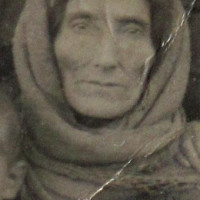Tutik_Zakaryan

Perhaps they did something do deserve the exile. How would I know why they were exiled. We were afraid to speak of it even within our family.
Hranush Kharatyan talked with Tutik Zakaryan (Pic. 1) and her daughter-in-law Nunufar Ghazaryan on June 8, 2012 in the village of Shikahogh in Syunik marz. The interview was summarized by H. Kharatyan.
Tutik Zakarian was born, married and lived her entire life in Shikahogh. She had six siblings – three sisters and three brothers. Tutik married a handicapped farmer who had lost his arm in the battlefield during the World War II. They had five sons and one daughter. One of Tutik’s brothers disappeared during the war and until now Tutik believes that he hadn’t fallen during the war and even if he is dead now, he must have children somewhere in the world. The thoughts about her lost brother are the greatest nightmare of her life. She has lamented her brother’s disappearance for sixty-five years. Her other two brothers also died at early age leaving her paternal family without a male heir, which is one more reason for Tutik’s anguish. Although Tutik has lived a relatively peaceful family life, the traumas of losing her brothers left a prevailing trace over the other major experiences of her life. (pic 2)
Tutik has taken little interest in the life of her fellow villagers, their problems, not even the problems of the closest neighbors. She believes that: “My own problems are quite enough for me.” During our conversations she was reluctant to remember the events of 1930s. Her knowledge was not only fragmentary but also apathetic.
Unlike the people of Kapan or Syunik in general, who are eager to remember and to analyze their own history, Tutik does not even make an effort to picture Nzhdeh, assess who or what the Dashnaks and the Communists were and what kind of pressures the rural population was exerted to in the past.
“Yes, I remember”, says Tutik unwillingly, “Many people were exiled. They left, and when they were acquitted they came back. I do not know why they were exiled. The life was so harsh then. One of our acquaintances was exiled too. He died when he got back to the village. I have no idea about the reason they exiled him. I was never interested in that. Well, nobody was exiled from my paternal family or from my husband’s family and so I never took interest in it. My husband was a teacher but he never spoke about such things at home. I do not even know if he knew about it. I was a housewife: I didn’t do anything and didn’t say anything. Perhaps they have done something do deserve the exile. How would I know why they were exiled.
In the past there were people who hid in the woods, they were called ghachaghs [outlaws]. I don’t know if they were really ghachaghs but I know one family that was taken. They were ordinary people, people like us. They were taken at night, I recall people whispering to each other the news that someone else had been taken away at night. But the next day no one spoke of that. Yes, I heard about those things but those people have long been dead and I don’t know why they were taken, what did they do. Perhaps they committed something. My husband was a teacher for 40 years. We finished the school in very bitter circumstances in [19]44-45 [the end of Second World War]. As we were enrolling into the Komsomol the committee would inquire whether we had any social aliens among our relatives. They meant those who were caught and carried away.
Nunufar Ghazaryan (pic. 3) – Tutik’s daughter-in-law adds: “I do not know exactly why they exiled the people and then acquitted them. There was no reason. Whenever people said something about their situation, about their times, they would come and grab them. My mom used to say they were even afraid to talk at home. When Stalin died they were afraid even to utter the news. They feared that in case they got overheard the exile would not be far away. People did not dare to inform each other about Stalin’s death even after the public radio announced it, even within the family. There were agents everywhere and they informed on people. People didn’t know the identities of those informers and even if they knew, they wouldn’t dare to bring up the issue even to their family. Agents could have been planted inside the families as well. My grandma recounted they were afraid even to talk, when they heard on the radio that Stalin had died. They preferred to keep silent. That was how the things were in that period. It was scary.
You see, they were adults and they were nevertheless afraid to tell about it to their grandchildren. For example, my grandmother told it to us, but she didn’t mention who they were. She said, “When we heard about it, we didn’t dare to speak freely, because they could come and take us at night”. There is freedom of speech now. There is law. I think it will not happen again. Those were different times. May be now … if such a thing occurs, I will go and inquire about what happened and why it happened. I will bear in mind that if something of that sort happened to someone, tomorrow the same can happen to my family and me. I think people are more anxious about one another now than in the past.”
[nggallery id=17]

